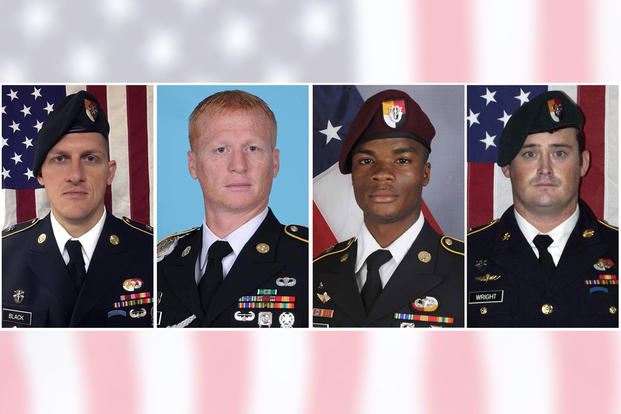The military has finally begun briefing the families of the four troops killed in the Oct. 4 Niger ambush on the official version of what went wrong.
"We're currently in the process of briefing the families of those fallen soldiers in order to provide them with the results of the investigation," said Col. Rob Manning, a Pentagon spokesman.
Once the family briefings are complete, Congress will get the results of the Article 15-6 fact-finding investigation. The report took more than five months to complete, and Defense Secretary Jim Mattis has said it is thousands of pages long.
According to Defense Department officials, the public then can expect a Pentagon briefing on the findings. That briefing could come as early as this week from Marine Gen. Thomas Waldhauser, commander of U.S. Africa Command, and his chief of staff, Army Maj. Gen. Roger Cloutier, who led the Article 15-6 investigation.
Related content:
- Niger Ambush Investigation Complete, Families of Fallen to Be Briefed
- Probe Finds Deadly Niger Mission Lacked Proper Approval
- Militants Release Video of Deadly Niger Ambush
However, Waldhauser told the House Armed Services Committee last month that the family briefings "could take a couple of weeks" due to the length and comprehensive nature of the investigation report and its implications for national security.
"The investigation was exhaustive" and "very, very detailed," he said of the report on what led to the deaths of four members of the Army's Third Special Forces Group outside the village of Tongo Tongo in northwestern Niger near the Mail border, about 120 miles north of the Nigerien capital of Niamey.
Waldhauser said the report also would include an animated video prepared by AFRICOM detailing the attack by a suspected offshoot of the Islamic State of Iraq and Syria called ISIS Greater Sahara.
Four Nigerien troops and a Nigerien interpreter also were killed in the ambush that took the lives of Sgt. La David Johnson, 25, of Miami Gardens, Florida; Staff Sgt. Bryan C. Black, 35, of Puyallup, Washington; Staff Sgt. Jeremiah W. Johnson, 39, of Springboro, Ohio; and Staff Sgt. Dustin M. Wright, 29, of Lyons, Georgia.
The investigation is expected to address how a routine training patrol begun Oct. 3 and estimated to pose little risk turned into a mission to capture a terror suspect named Doundou Chefou, who was believed to have taken part in the kidnapping of an aid worker.
The patrol raided an enemy camp but found it abandoned; it was attacked while returning to base near Niamey.
Under their rules of engagement, the 11 U.S. soldiers on the patrol "were authorized to accompany Nigerien forces when the prospects for enemy contact were unlikely," Joint Chiefs Chairman Gen. Joseph Dunford told reporters traveling with him to South Korea in December.
Dunford said he had read the mission assignment for the patrol "and it was a patrol to go out and identify information about the local area."
However, he said, the patrol "was not targeted or focused on any specific Islamic State leader or location, because that would have made the mission enemy contact more likely. The estimate at the time was enemy contact was not likely."
Last month, The Associated Press reported that a preliminary draft of the Article 15-6 investigation found that the raid on the abandoned camp may have been carried out without the approval of senior commanders.
-- Richard Sisk can be reached at Richard.Sisk@Military.com.












